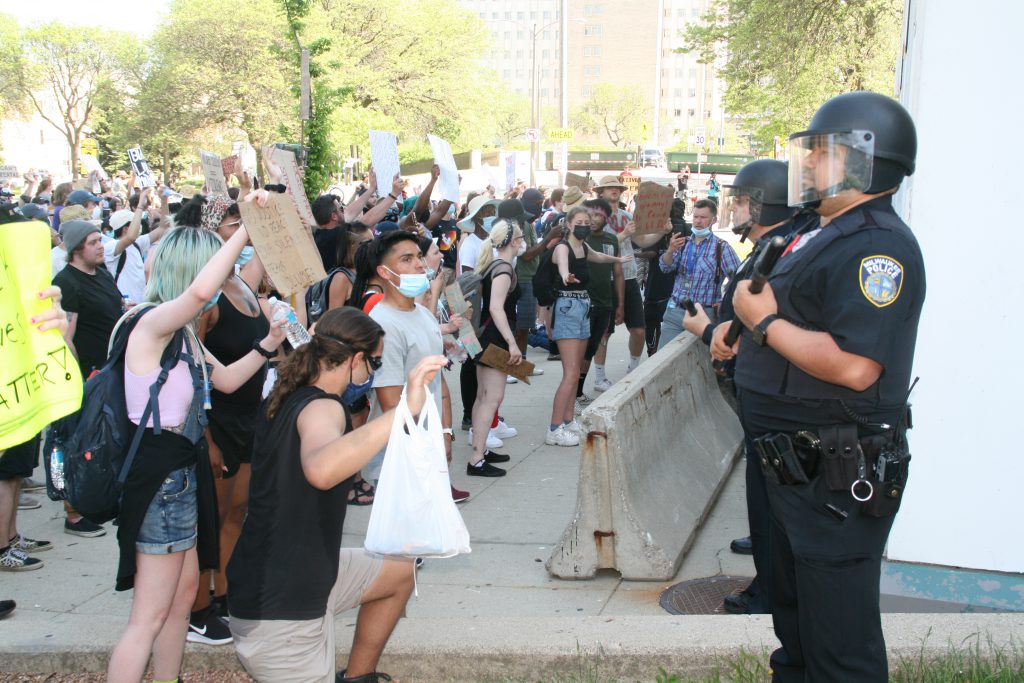How Does Police Reform Compare To Other Cities?
New report finds four areas for improvement.

Milwaukee Police Department officers guard the MPD administration building in June 2020. Photo by Jeramey Jannene.
The killing of George Floyd by a Minneapolis police officer triggered a nationwide call for police reform. A year later, how does Milwaukee stack up against its peer cities in instituting reforms?
A new, 48-page Wisconsin Policy Forum report examines five peer cities across six areas of review: use of force, data collection and record keeping, accountability and transparency, training and support, demilitarization and reimagining public safety.
But if what you’re looking for is not an analysis of whistleblower protection policies in various cities, but instead suggestions for improvement in Milwaukee, WPF has four clear ideas.
The report calls for increased investment in the city’s Office of Violence Prevention. While warning that much of the office’s $3.7 million budget comes from grants, the authors suggest finding ways to use some of the city’s $394 million in American Rescue Plan Act funds to expand the office. They also suggest finding ways to measure and evaluate the success of violence prevention efforts to guide future investment.
The authors also call for better reporting to the public. This suggestion targets not only the Milwaukee Police Department, but the Fire & Police Commission that oversees department policies and hiring. They specifically call for more information to be collected and released on no-knock entries, responses to individuals in mental health crisis and citizen survey data.
The final suggested area for improvement is the continued evaluation, reimagining and strengthening of protocols. “Two areas we identified that might benefit from further scrutiny are whistleblower protection and critical incident review; MPD’s policies and protocols fall short of those in peer cities like Baltimore on the former while the department’s review of critical incidents currently does not involve citizen participation,” write the authors.
The report comes with an important caveat: it examines only policies, not actual MPD practices. Citing the example of a recent progress report from the city’s third-party monitor on its settlement with the American Civil Liberties Union regarding stop-and-frisk practices, the report’s authors note that the execution of policies is not the same as the adoption of them. It also doesn’t examine how other criminal justice system entities, including the district attorney and judges, are influencing policy and conduct.
The report was requested by Mayor Tom Barrett and paid for via a grant from Bader Philanthropies.
A full copy of the report is available on Urban Milwaukee.
If you think stories like this are important, become a member of Urban Milwaukee and help support real, independent journalism. Plus you get some cool added benefits.
More about the 2020 Racial Justice Protests
- Plea Agreement Reached On Long-Pending Sherman Park Unrest Charges Involving Vaun Mayes - Jeramey Jannene - Oct 17th, 2024
- Rep. Ryan Clancy Settles With City Following 2020 Curfew Arrest - Jeramey Jannene - Dec 12th, 2023
- Supervisor Clancy Applauds Settlement in Clancy vs. City of Milwaukee - State Rep. Ryan Clancy - Dec 12th, 2023
- Tosa Protest Assails Federal Court Decision Exonerating Police - Isiah Holmes - May 9th, 2023
- Wauwatosa ‘Target List’ Trial Begins - Isiah Holmes - May 3rd, 2023
- Shorewood Spitter Found Guilty For 2020 Protest Confrontation - Jeramey Jannene - Apr 20th, 2023
- City Hall: City Will Pay 2020 George Floyd Protester $270,000 - Jeramey Jannene - Feb 14th, 2023
- Tosa Protest Tickets Dismissed - Isiah Holmes - Jul 21st, 2022
- Op Ed: ‘We Need More’ - Charles Q. Sullivan - Mar 4th, 2022
- Milwaukee Officers Circulate “2020 Riot” Coins? - Isiah Holmes - Nov 14th, 2021
Read more about 2020 Racial Justice Protests here




















